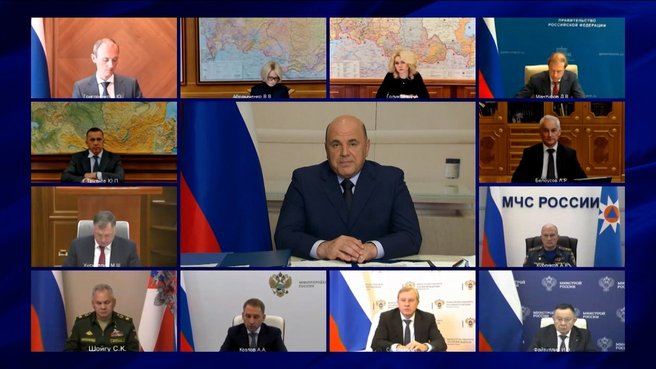Agenda: Developing transport corridors, simplifying the process for calculating lease payments for state and municipal land, and supporting the regions affected by natural disasters.
Mikhail Mishustin’s opening remarks:
Good afternoon, colleagues.
Today we will discuss the implementation of the tasks set as part of the roadmaps on the development of three transport corridors adopted last December. These are the North-South international corridor and the Azov-Black Sea corridor, and the Eastern corridors. A series of measures will help increase the capacity of the infrastructure, including railways, highways, waterways and seaports.
These new routes are important for boosting foreign trade amid the sanctions. The President has underscored the importance of constant monitoring of the developments in logistics.
The dynamics are positive. Bypass roads have been built around Krasnodar and Rostov-on-Don. Traffic capacity has been expanded towards the Verkhny Lars border checkpoint. Dredging has been completed at the Port of Makhachkala, as has the reconstruction of the road around Anapa. Several new facilities have been opened in recent months, and cargo transport at some busy sections has become faster.
In December, plans call for completing the dredging of the Volga-Caspian Sea canal. For railway, we expect that the aggregate capacity of the Baikal-Amur and Trans-Siberian railways will reach 173 million tonnes by the end of this year. Next year, it should reach 180 million tonnes. This was the goal set by the President.
I want to point out to all of you that any delay of these adopted schedules is unacceptable. I want to ask First Deputy Prime Minister Andrei Belousov to improve oversight control of deadline management.
Our main goal is to provide for the balanced development of the transport infrastructure. Most importantly, with regard to the expected increase in cargo traffic towards the friendly countries of South and Southeast Asia, the Caspian region, the South Caucasus, as well as the Persian Gulf and Africa.
Another issue on today’s agenda relates to simplifying the procedure of calculating lease payment for state and municipal land.
At the President’s instruction, the Government continues to create a transparent mechanism for the use of such land plots. Various approaches are currently used to determine lease payments. In addition to the cadastral value, they include market value appraisal and interest rates that are being used in some places. That is, there is no single mechanism.
To simplify this, amendments have been worked out for the legislation in this area. The lease payment for a land plot which is owned by the state or municipality will be determined based on cadastral value.
An exception will be made for land offered at auctions because the lease payment is set during the auction. This mechanism will come into force in two and a half years, so that the regions and municipalities will have enough time to prepare for the change.
We hope that this measure will help create an integrated legal framework in this area and develop clear and transparent mechanisms for land agreements.
Let’s talk now about support for the Russian regions, for now, those that were hit by natural disasters.
The President emphasised that the scale of natural disasters in some regions has been unprecedented.
Unfortunately, many our regions have been traditionally put to the test by extreme weather. But regardless of how big the disaster was, it is important to help people and not leave them alone with their problems.
In the past two years, houses and buildings have been destroyed and damaged by floods in the Trans-Baikal Territory. Almost 250 households now have to restore or do major repairs at their houses.
To that end, 2.75 billion roubles were allocated; today, we will send an additional half a billion roubles.
This measure will help hundreds of people get their homes back.













